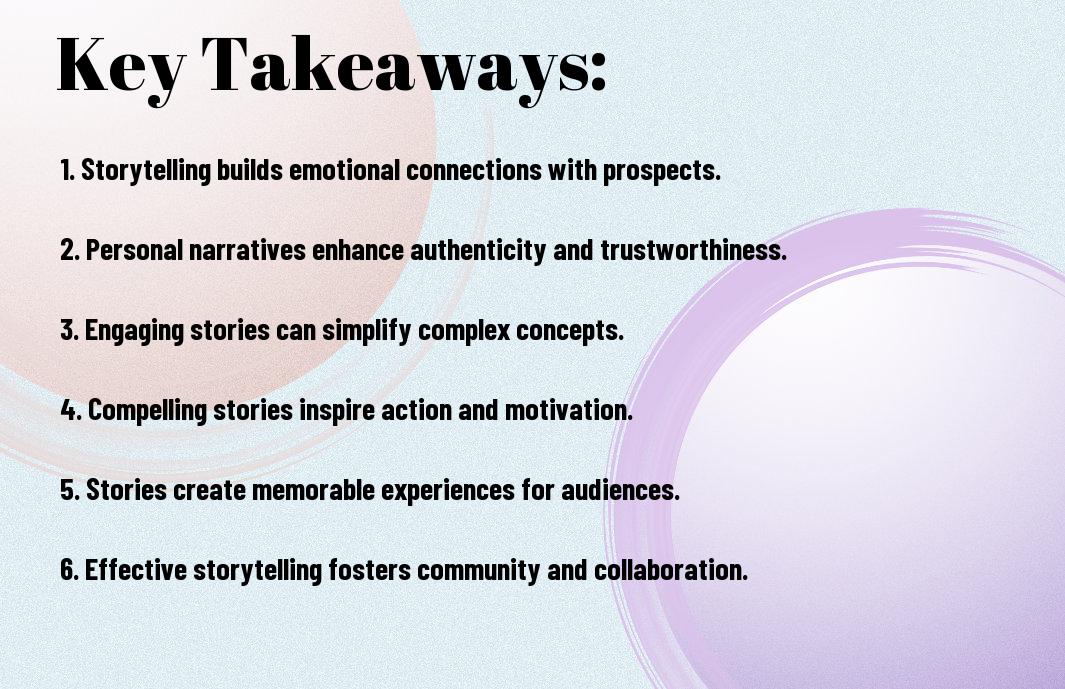Over time, you may have noticed how compelling narratives can transform your network marketing efforts. The art of storytelling not only helps establish stronger connections with your audience but also cultivates trust and relatability. By sharing your experiences and the journeys of others, you can effectively inspire and motivate potential customers and team members. In this blog post, we’ll explore why storytelling is an imperative tool for your success in the network marketing space and how to harness its power effectively.
Key Takeaways:
- Engagement: Storytelling enhances emotional connection with potential customers, making the product or opportunity more relatable.
- Brand Building: Personal stories help in establishing authenticity and credibility for both the brand and the individual marketer.
- Inspiration: Sharing success stories can motivate others to take action and join the journey, fostering a community spirit.
- Education: Stories can simplify complex concepts, making it easier for people to understand the benefits of a product or service.
- Retention: Narratives help keep customers and team members engaged, ensuring a loyal following and repeat business.

The Importance of Storytelling in Network Marketing
Your ability to share compelling stories is vital in network marketing. It allows you to connect with clients and prospects, making your message resonate on a personal level. By weaving narratives into your approach, you not only enhance your brand’s visibility but also cultivate relationships that transition into trust and loyalty. This impact can significantly elevate your success in the industry.
Building Trust through Personal Narratives
Personal storytelling establishes credibility and fosters a sense of authenticity. By sharing your unique experiences—both triumphs and challenges—you create a relatable image that resonates with your audience. These narratives help you build rapport and trust, making potential clients more receptive to your offerings. (Your stories can turn skeptics into believers.)
Creating Emotional Connections
Connections forged through storytelling evoke emotions and bind you to your audience on a deeper level. As you share relatable experiences, you tap into feelings that influence buying decisions and recruiting efforts. Strong emotional ties can make all the difference in a competitive landscape. (Your stories have the power to inspire and convert.)
At the core of effective storytelling is the genuine desire to engage your audience. By conveying authentic experiences, the connection you create not only enhances your visibility but also strengthens the relationship you have with potential clients. When they see your vulnerability and perseverance, they are more likely to resonate with your narrative and feel inclined to join your journey. (Your narrative defines your brand and can drive your success.)
Types of Stories to Use in Network Marketing
You can enhance your network marketing approach by utilizing various types of stories that resonate with your audience. Here are a few effective story types:
| Origin Story | Share your journey and experiences. |
| Customer Testimonials | Highlight the successes of your satisfied clients. |
| Success Stories | Showcase the transformations from using your products. |
| Problem/Solution Stories | Discuss challenges and how your product solves them. |
| Vision Stories | Present the future you envision with your products. |
The What is Storytelling in Marketing and Why Should You Care? discusses how different types of stories can enhance your marketing effectiveness.
The Origin Story
Marketing your journey in network marketing can be a powerful tool. By discussing the *challenges* you’ve faced and the *success* you’ve achieved, you create a narrative that is both relatable and inspiring. Ensure that your story is authentic and reflects your unique experiences, as this connection can motivate a sense of trust within your audience. (Taking the time to share your story can significantly impact your relationship with your prospects.)
Customer Testimonials and Success Stories
Above all, leveraging success stories from satisfied customers helps illustrate the effectiveness of your product or service. By sharing their experiences, you can enhance your credibility and encourage engagement among potential customers.
Another technique involves showcasing how your products have transformed the lives of your past customers. These *powerful* narratives highlight *real-world* outcomes, making it easier for potential customers to visualize their *own* success. Customers appreciate hearing about others who faced similar challenges and *ultimately succeeded*, which builds your product’s trustworthiness and appeal.

Techniques for Effective Storytelling
All effective storytelling techniques rely on structured narratives that resonate with your audience. By focusing on character development, you can create relatable figures that evoke emotions, while conflict resolution provides a satisfying conclusion that highlights your message’s core values. Engaging your listeners involves presenting relatable challenges that your characters face and overcome. (Decide to incorporate these elements in your next story to enhance its impact.)
Crafting a Compelling Narrative
Among the key elements in crafting a compelling narrative is ensuring your story has a clear structure, complete with a beginning, middle, and end. Develop your characters authentically, allowing your audience to connect with their journeys. Introduce conflict relevant to your message, showcasing the struggles that lead to resolution and growth. By weaving these elements together, you can create a persuasive narrative that captivates your audience.
Utilizing Visual Storytelling
Before launching into storytelling, consider how visual elements can elevate your message. Incorporating visuals, such as videos and infographics, can significantly enhance comprehension and engagement. These tools not only draw attention but also simplify complex ideas, making them easier for your audience to grasp. When used effectively, visuals replicate emotions and messages that text alone may not convey.
Also, using visuals fosters greater retention and understanding of your story’s message. When paired with strong narratives, these visuals can evoke powerful emotional responses from your audience. Infographics allow for quick insights, while videos can showcase real-life testimonials, making your message more relatable. Ultimately, combining visuals with storytelling provides a more dynamic and engaging experience for your audience.

Implementing Storytelling Strategies in Your Marketing Plan
After understanding the significance of storytelling in network marketing, it’s imperative to actively implement storytelling strategies within your marketing plan. By doing so, you can create more authentic connections with potential clients, as they resonate with relatable experiences. Discover more about how to effectively use storytelling in your marketing by reading The Power of Telling Your Story in Network Marketing.
Incorporating Stories into Presentations
Your presentations can become more engaging when you incorporate personal stories related to your product or experience. This not only enhances the emotional connection with your audience but also makes your message stick. (Create a narrative that aligns with your audience’s needs for maximum impact.)
Leveraging Social Media for Storytelling
Plan to utilize social media platforms wisely by sharing your personal and relatable stories to engage with your followers and effectively grow your network. Each platform has unique features that you can leverage to showcase your narrative and attract a wider audience.
Plus, by consistently sharing your stories online, you can build trust and foster stronger relationships with your audience. Highlighting your successes and challenges creates a sense of authenticity that followers appreciate. Don’t forget to interact with your audience—responding to comments and messages can greatly enhance your relationships and lead to more opportunities.
Measuring the Impact of Storytelling
Now that you understand the significance of storytelling in network marketing, it’s imperative to assess its effectiveness. Measuring the impact of your narratives will empower you to refine your approach, ensuring it resonates with your audience and drives results. By focusing on engagement and feedback, you can elevate your storytelling efforts to new heights.
Tracking Engagement Metrics
Above all, understanding various metrics to track the effectiveness of your storytelling efforts is vital. Pay attention to metrics such as social media shares, comments, and click-through rates. Analyzing these metrics allows you to adapt and refine your approach for better results, thus ensuring your stories reach and engage your target audience.
Gathering Feedback and Iterating
At the core of enhancing your storytelling is soliciting feedback from your audience. Engaging with your listeners enables you to identify what resonates and what doesn’t. Incorporating their insights ensures your narratives connect on a deeper level, ultimately boosting engagement and loyalty.
Also, when you actively seek feedback, you foster a sense of community among your audience. This input is incredibly valuable; your customers may reveal positive aspects of your storytelling that you hadn’t considered, as well as potential weaknesses that require attention. Iterating based on this feedback enhances your narratives, making them more impactful and aligned with your audience’s desires and needs.

Conclusion
Following this exploration of storytelling in network marketing, you can see how powerful narratives can transform your approach to connecting with potential clients and team members. By weaving your personal experiences and the stories of others into your marketing strategy, you enhance your authenticity and relatability, fostering deeper relationships. Embrace storytelling as a vital tool in your arsenal to inspire, engage, and expand your network, ultimately driving your success in the ever-evolving landscape of network marketing.
FAQ
Q: How can storytelling enhance my network marketing efforts?
A: Storytelling can significantly enhance your network marketing efforts by creating an emotional connection with your audience. When you share personal experiences or success stories, it helps potential customers and recruits relate to your journey. This relatability builds trust and can motivate them to take action, whether it’s making a purchase or joining your team.
Q: What types of stories should I tell in my network marketing strategy?
A: In network marketing, you can share various types of stories, including your personal success story, customer testimonials, and stories about overcoming challenges. Highlighting the benefits of your products through real-life examples can be particularly effective. Additionally, incorporating stories about others who have found success within your network can inspire potential recruits and customers.
Q: How do I effectively craft a compelling story for my audience?
A: To craft a compelling story, start by identifying the key message you want to convey. Create a narrative arc that includes a relatable challenge, a turning point, and a resolution that showcases the benefits of your product or opportunity. Use descriptive language and engage your audience’s senses, which can deepen the emotional impact of your story. Keep it authentic and genuine to connect with your audience on a personal level.
Q: How can I incorporate storytelling into my social media marketing?
A: You can incorporate storytelling into your social media marketing by sharing your stories through various formats. Use posts, videos, and live storytelling sessions to engage your audience. Create a series of posts that follow a narrative, share behind-the-scenes glimpses into your journey, or feature customer stories. Consistency in your storytelling can help build anticipation and keep your audience engaged.
Q: What role does vulnerability play in storytelling for network marketing?
A: Vulnerability plays an necessary role in storytelling for network marketing. By sharing struggles and setbacks, you show authenticity and relatability, which can resonate with your audience. This openness can inspire trust and make your success stories more impactful. It’s important to strike a balance by showcasing how you overcame challenges while still maintaining an uplifting and motivating message.



